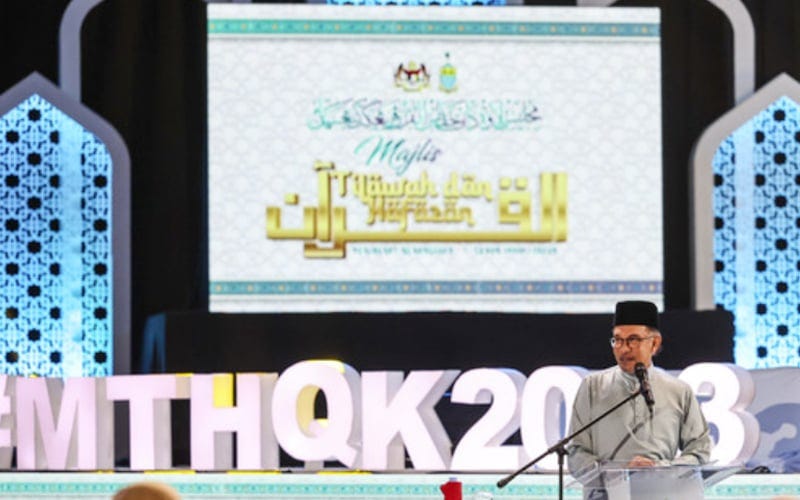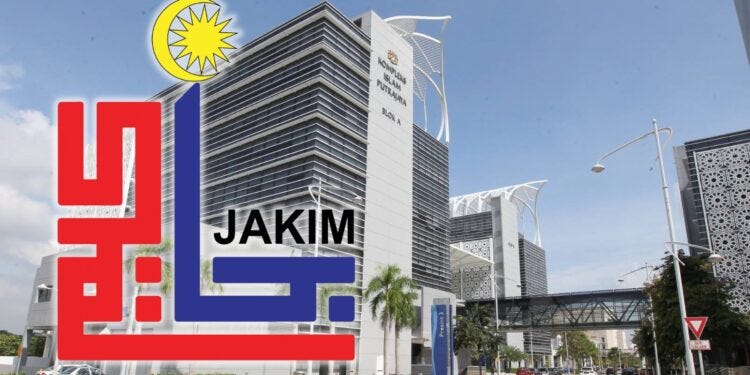Malaysia’s plunge into theocracy
Islamists rather than economists will steer the economy
The Malaysian Islamic Development Department (JAKIM) is now being given a greater role in national policy making. According to the prime minister Anwar Ibrahim, JAKIM leaders have been charged with drafting a national development policy framework, based on the Malaysia Madani framework. This includes involvement in the framing of budgets and five-year plans. This is on top of the new censorship powers JAKIM has been given over social media.
The Anwar administration has now turned towards ulamas, rather than economists to frame Malaysia’s national economic and development policy directions and guidelines. The majority of personal within JAKIM have academic backgrounds within the domain of Islamic studies, rather than development and economics. This is a massive expansion upon the working role of JAKIM, very much in line with former prime minister Mahathir Mohamed and then deputy prime minister Anwar’s Islamization of government back in the 1990s. One would assume by Anwar’s recent announcement, that policy planners and economists must in future work within the economic framework JAKIM provides.
By definition, Malaysia has now entered into the realms of becoming a theocracy. A theocracy is a government by divine guidance or by officials who are regarded as divinely guided. This is more the system of government used in early civilization, than in contemporary civilizations, around the world today.
In addition, JAKIM’s own mission is to look after the welfare of the Ummah. This ensures the RM 1.0 billion funded JAKIM will promote the welfare of Muslims, aka Bumiputeras over other ethnic groups, thus prolonging ‘Ketuanan Melayu’, or Malay supremacy within the nation’s economy.
There are very few other countries in the world, where the ulama oversee economic policy. The closest model would be Iran, which like Malaysia has an extensively state-owned economy, where 60 percent of the economy is centrally controlled. If JAKIM in its new role in outlining the economic direction of the nation, adopts ideas from Iran, it can be expected that Islamic theological institutions will be integrated much more into the economy in the future. One would expect JAKIM to look at Islamic economic models, rather than ‘western’ approaches to economics. This is expected to the case, as prime minister Anwar has also instructed JAKIM to follow the principles of MADANI, which in itself is pseudo-Islamic.
Major concerns over JAKIM
There are two major concerns over JAKIM, as an organization in the new role it will be playing. In an unpublished interview with the Director-General of JAKIM Hakimah Mohd Yusoff, earlier this year, two important questions were asked of the DG.
Could you explain the lines of authority to both the minister and the Sultan? How, how does it actually work?
DG of JAKIM: Um, Mr. Hunter, I think, uh, I don't want to answer this question. I'm so sorry, but, um, I'm not ready for that. So, um, maybe we can skip this question.
What is JAKIM doing to safeguard heterogeneous views and maintain balance within the organization?
DG of JAKIM: It influenced, I, I, um, Mr. Hunter, I, I don't think I would like to answer this one, <laugh>.
With JAKIM taking on this new role, it is important Malaysian fully understand who JAKIM actually reports to. The answer from the DG is concerning, as there is no clarity as to who actually controls JAKIM.
The second question relates to the balance and heterogeneous views within JAKIM itself. With JAKIM taking on the steering role of the nation, the public must be assured that JAKIM itself is balanced.
This is especially in the like of the knowledge that organizations like the Alumni, who have members working with JAKIM and other government organizations, are receiving payments from monies, sourced from foreign countries. This is an important matter of national security, when JAKIM is no undertaking such important strategic and nationally important work. The public must be assured there is no foreign influence in its work.
Pundits are claiming this is a political move in an attempt to secure the Malay vote in the coming state elections. However, if Anwar’s rhetoric is cast aside, and actions are studied, Malaysia is certainly heading into a period of more conservative Islam in government. In seven months, Anwar has extended government authority over Islamic matters, much more than the last three administrations combined.
DAP, as part of the government has been totally silent on the matter. This silence will cost them some political support. However, DAP should not lose any seats in the coming state elections, because of the large winning margins they hold most seats by. Another potential casualty will be foreign investors, who may see the Islamization of economics as a negative factor. Direct foreign investment should be monitored closely.
In practice, future government plans and projects may have to be vetted by JAKIM before they can proceed. This may also have implications over states, where state projects could be subject to the veto by JAKIM. The potential problem in the future is that those who don’t heed the advice of JAKIM will be deemed un-Islamic in the future.
This is the most radical change in the way Malaysia is governed since the New Economic Policy (NEP) was launched back in 1971. Secularism has been cast aside, where Islamic apparatchiks will have a major say in the running of the state, and take power away from the parliament and executive.
Subscribe Below:






If one looks at Malaysia with an open and forensic mind and how it functioned and was implemented since the advent of the British colonial rule , one cannot but conclude that Malaysia from that time to this day with some exceptions was and remains a Christian Theocracy.
A theocracy today is defined in much the same way as the term terrorism is defined. It is narrow and applicable only to certain social (and religious) classes in a highly selective and politicized way..
Everything including laws and property under British rule was ascribed to the King or Queen of England and its control subject to the whims and fancies of the British Monarchs and their ecclesiastical laws which found interpretation and disguise in their temporal laws. How you might ask then does English law constitute a theocracy?
Put simply, the King is head of parliament and all of government in whose name all laws are made or unmade as the case may be.
The King is necessarily the head of the Church of England and even though the Archbishop of Canterbury has power over ecclesiastical matters, these laws of the Church of England are passed by Britain's parliament by ascent into law in the King's name.
The Church of England has the power to decide who the monarch of the day or their entitlements to the throne are. Who they can marry (except a Catholic which automatically disentitled them to the throne or any position by succession).
The Church of England is the head of that theocracy in the UK which by the UK's powers over their domains extended to all Britain's colonies. France and Spain were no different except in their brutality over non Catholics. Garroting non believers even after they converted and pledged their loyalty to the Pope and the King of Spain.
Malaysia's and all colonial constitutions were subject to British beliefs in their God and their religious principles. An example is the doctrine of the separation of "church and state". Malays as Muslims had and have no church even in literal and figurative terms.
Just because western nations are more permissive socially and tend to ignore their Christian principles, that of itself does not mean they live outside a theocracy and in a secular state. They tend to gloss over their repression of non Christian religions including the various Christian sects (Branch Dravidian "cult" and the Church of Scientology (banned as a cult in Germany-I digress a bit here because the list of "secular" breaches is very long).
The way the west excises a religion is by reducing its status to 'cult' from relgion.
Muslims gave us divorce law, alimony, the laws of trade and commerce were purpoined from Islamic law in the Golden age of Islam. They also gave us the sharia which also includes rules on marriage, divorce, inheritance, commerce, torts, war, international relations, and government.
Too often Sharia is mentioned in the pejorative to scare people into believing it like Hudud consists of amputations and stoning. In fact Stoning is not mentioned in Islamic law at all. It is derived from the Book of Deuteronomy(Jewish Christian oldd testament).
Although to a large extent I do not agree with everything Anwar advances in government and politics, prior to and since his ascendancy to prime ministership, I do not believe in his right mind he would consider these exaggerated Taleban punishments as a just and progressive inclusion into Islamic law he has committed to gradually introducing into Malaysia.
After all he and his wife proclaimed their desire to turn Malaysia into an Islamic state. The middle ground liberals and NGO's all backed him into government and must now live with him and his policies as their choice.
No one else is to blame if they don't like Anwar and his commitments into turning Malaysia into an Islamic state.
It just goes to show how the Patricia Yeohs, Ambigas, Marina Mahathir's, Hannah Yeoh's and Teresa Koks, the Sivarasah Rasiah's and others like them are and have been all along for aa ride to self destruction. In the end the Malays will rightfully trump them all. Uppity urban Malays included
Financial Institutions at the time of 3rd Caliph Uthman Bin Aff'an
o Applying the general financial policy of Islam
o Creating a balance between collection of dues and the welfare of the people
o Taking from the Muslims what they owed to the treasury of the Muslims
o Giving the Muslims what they are entitled to from the treasury of the Muslims
o Taking what the ahl al-dhimmah(non muslims) owe to the treasury of the Muslims in a proper manner, and giving them what they are entitled to, and not wronging them
o Selecting tax collectors for their honesty and sincerity
o Avoiding financial corruption, which would lead to prosperity for the entire ummah
There can be no doubt that the third caliph - 'Uthman Bin Affan was determined to apply the financial policies of Islam.
These are the fundamentals.
The rest are mere technology that speed up the wealth creation that needs to be regulated.